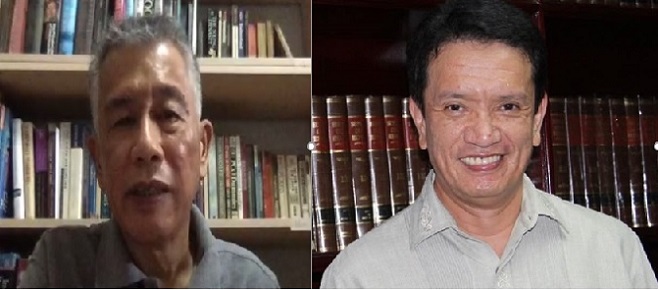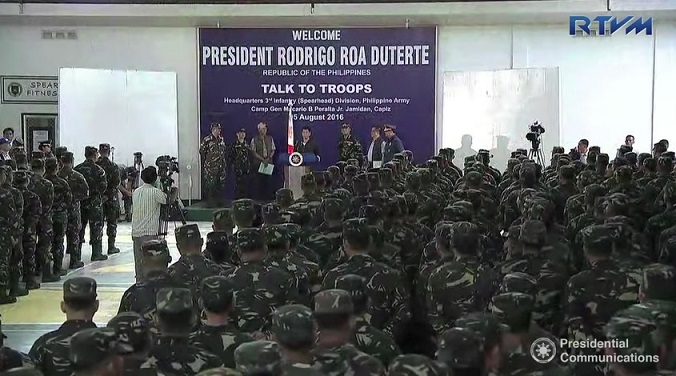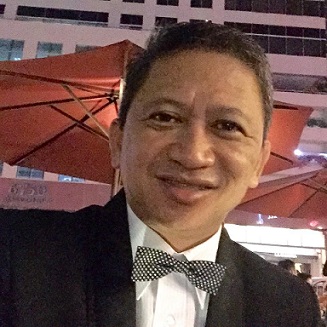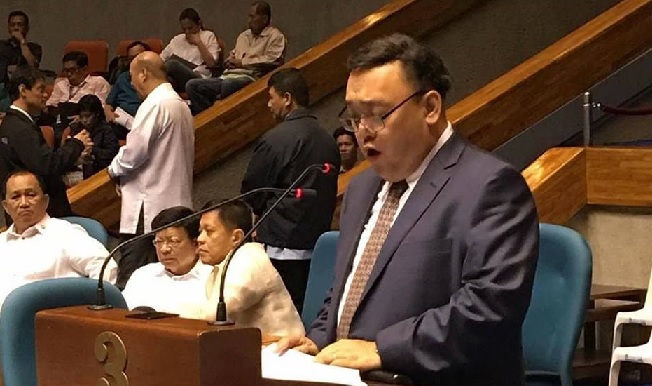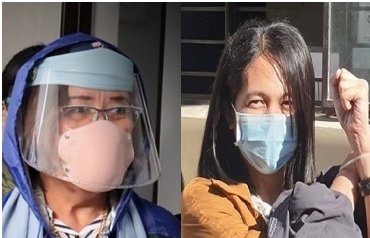
The case of illegal possession of firearms and explosives against journalist Lady Ann “Icy” Salem of Manila Today was dismissed last Feb. 5 but she continues to be in jail in Mandaluyong City.
A drug case against Sen. Leila De Lima was dismissed last Feb. 17. She, however, remains in detention at the Philippine National Police Custodial Center in Camp Crame, Quezon City because she still faces two other cases.
Salem’s lawyer, Kristina Conti of the Public Interest Law Center, speaking at a rally of the journalist’s supporters in front of the Mandaluyong City Regional Trial Court, said last Friday that the Feb. 5 dismissal of the case against Salem and trade unionist Rodrigo Esparago was not accompanied by a release order.
Conti said there’s no legal reason for Salem to stay a minute longer in jail for a case that is “walang ka kwenta-kwenta (senseless).”
Salem was arrested last Dec. 10, while the world was marking Human Rights Day, based on a search warrant issued by Judge Cecilyn Burgos-Villavert of the Quezon City Regional Trial Court.
In dismissing the case against Salem, Presiding Judge Monique Quisumbing-Ignacio declared the police officers’ search warrant void for being vague after they confiscated items not listed in the warrant.
News reports noted that instead of confiscating only one laptop and one unit of cellphone, as stated in the search warrant, the police took four laptops and five cellphones of different brands.
“The raiding team did not limit themselves to the items listed in the Search Warrants … The seizure of these items is unlawful as even the ‘plain view doctrine’ is clearly inapplicable to these cases,” said the court that also found substantial inconsistencies and contradictions in the testimonies of informants.
“Since the sole basis of the issuance of the Search Warrants w(as) their (informants) sworn statements and testimonies, the Court finds that probable cause was not sufficiently establish(ed),” the dismissal order stated.
In blocking Salem’s release, the prosecutor was insisting that the dismissal is not yet final because it is under appeal. Conti, however, said it does not hold water because the case can go on without keeping Salem in jail.
Conti said Salem, 35, is holding on admirably in detention. She shares an 8 feet by 3 feet detention cell in the Mandaluyong City jail with five other women detainees.
“To maximize the space, they have hung up hammocks up the steel bars where some of them sleep,” said Conti.
De Lima, on the other hand, is marking her four-year imprisonment by launching two books: “Dispatches from Crame I” and “Faith, Hope & Love: Dispatches from Crame II.”
Reacting to the dismissal of one of the three drug cases against her, De Lima, who investigated President Duterte’s alleged human rights violations when she was chair of the Human Rights Commission and Duterte was mayor of Davao City, said: “To be acquitted even in just one case, in the time of Duterte, is a moral victory. “
In the statement read by her lawyers during a press conference after the dismissal of Criminal Case No. 17-166, she took the opportunity to explain the two remaining cases and her situation in detention.
She said that even if the Demurrer to Evidence and Motion for Bail in her other criminal case (No. 17-165) was denied, she and her lawyers believe that the government does not have a strong evidence to prove their trumped-up charges.
In the case “conspiracy to engage in illegal drug trading,” De Lima said the prosecution has not come up with any evidence of the alleged crime. “Walang kahit isang testigo na nagpatunay na ako at ang aking kapwa akusado ay nakipagsabwatan sa mga drug lords para maglako o magbenta ng ilegal na droga sa Bilibid. (Not one of the witnesses proved that I and the other accused conspired with the drug lords to sell illegal drugs in Bilibid.),” she pointed out.
According to her, the prosecution’s witnesses whom it described as “drug lords” have denied that they were drug lords and asserted that they had never entered into any illegal deal with the senator.
She underscored the anomaly in the charges filed against her: “Ito lang din ang katangi-tanging mga kaso tungkol sa droga na kahit isang butil o gramo ng droga, ay walang naipresenta. (This is the only drug case in which not a single grain or gram of drugs was presented.”
“Ibig sabihin, puro laway lang ang basehan (It means their basis is all saliva),”she said.
De Lima explained it has been proven that Case 17-165 was not about drugs but about the unbridled corruption and malpractices in the Bureau of Corrections (BuCor) such as paying prison officials for the return of their privileges which she stopped when she was justice secretary.
De Lima said her accusers have not proven that she received money from the alleged sale of illegal drugs. “Puro tsismis. Puro haka-haka lang. (It was all gossip. Pure speculation.)”
She added: “Mula’t sapul, ang mga kasong ito ay ginagamit lamang na paraan para patahimikin ako at gambalain ang aking paglilingkod sa bayan bilang senador, sa paglaban sa kawalang hustisya at pagtataguyod ng karapatang mamuhay nang marangal at may dignidad ng ating mga kababayan, lalo na ang maralita. Subalit mula noon hanggang ngayon at sa darating pang mga araw, hindi ko hinayaan at hahayaang magtagumpay ang ganitong taktika.
(From the beginning, these cases were used to silence me and prevent me from serving the people as senator, to fight injustice and for the right of our countrymen to live with honor and dignity, especially the poor. But from the beginning up to now and in the coming days, I did not and will not allow this tactic to succeed.)”
De Lima said if those in power would be allowed to circumvent the law to imprison an innocent senator, what more when their target are the poor and the defenseless. “To jail one innocent person – whoever they may be – is an insult to every Filipino who deserves a better government, and an assault on the future of our country,” she said.
Salem and De Lima are two faces of courage against an insecure thug in power. They need and deserve the people’s support.
